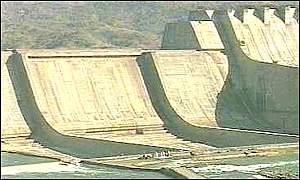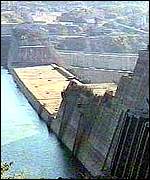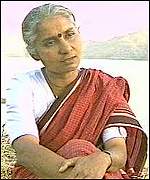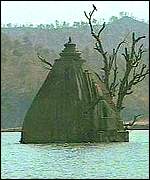Sardar Sarovar dam: At what price progress?
Monday, 23 March, 1998, 10:35 GMT |  news.bbc.co.uk
news.bbc.co.uk

If the half-built dam is not finished all the money spent on it so far will have been wasted
For the last three years the people who live on the banks of the Narmada river in India have managed to halt the construction of a dam that threatens to destroy their way of life.
Delhi correspondent Sunita Thackur's report on the Sardar Sarovar dam for the BBC2 programme Correspondent is part of the BBC's Waterweek, a series of programmes dedicated to water themes.
|
The Indian Government intended that the billion pound dam would provide electricity and drinking water for the nearby cities. But the local people, who had not been consulted about the development of the dam that would submerge their villages, rejected the plan. After years of resistance international funding dried up and building work stopped.
The dam was to have been the second largest in the world and many more are planned along the banks of the 800 mile long river, where over 300,000 people live. Unless the Sardar Sarovar dam is completed it cannot generate electricity and the many millions of pounds already spent will have been wasted.
The leader of the resistance
|
Local people found a champion in the unlikely form of Medha Patkar, an ordinary women who has taken on the might of the Indian Government and the World Bank.
Medha Patkar, originally from Bombay, is committed to non-violent protest. She helped to galvanise the women of the village of Manni Belli into opposing the dam when their homes were threatened. She was beaten and jailed many times. Some of the women who joined her were tortured and raped.
Although the village was eventually flooded, it was the women's resistance that led to a Supreme Court order stopping work on the dam, pending a complete review.
|
"Gigantic powers were against us. But we were never pessimistic. If one has no hope - one must not fight the battle," said Medha Patkar.
Medha has rejected the accusation that she and the villagers are standing in the way of progress.
"The technology, the project planning or the decision to lend the money by the World Bank to acquire the land or to take away the river water to some other area never involved people. It doesn't accept the right to information that people have. It doesn't accept the right to their own development," she said.
Although the Sardar Sarovar dam has been at a standstill for three years villagers along the banks of the river are still being given notices by the authorities to quit their land. There are fears that construction will start again.
|
Medha Patkar's fight against big dams is no longer just grass roots politics but has become recognised the world over. She is now on an international commission of the World Bank, which has been set up to question the value of projects like the Sardar Sarovar dam.



